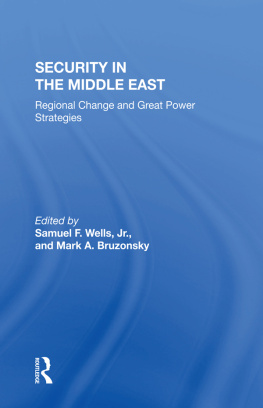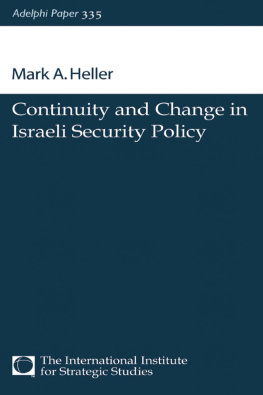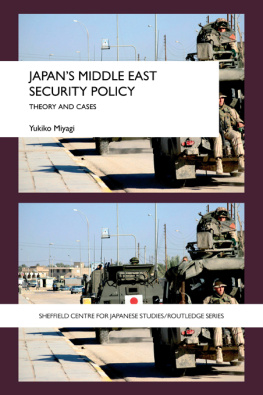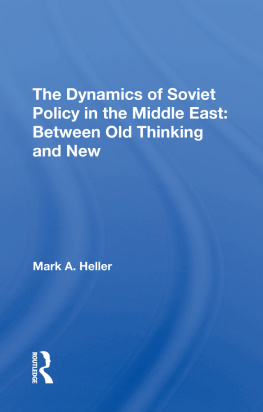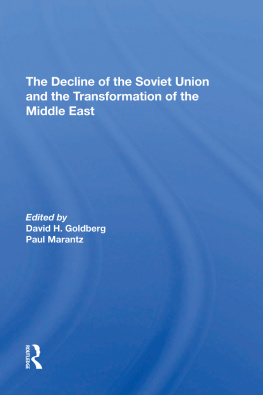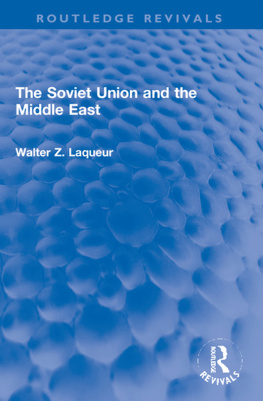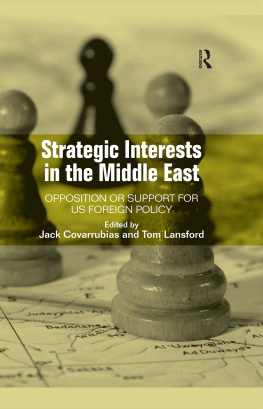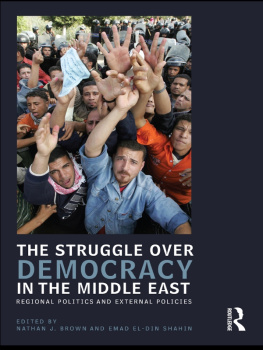SECURITY IN THE MIDDLE EAST
About the Book and Editors
This book examines the deep-seated problems in the Middle East and their impact on the United States and its allies. Exploring the disruptive effects of the double-edged sword of nationalism and modernization, the contributors discuss the full range of Western security interests in the region. Case studies of key countries emphasize the prospect for peaceful political, economic, and cultural change. The authors analyze the ramifications of the Arab-Israeli conflict and the threats posed by Soviet penetration. Arguing that confusion and contradiction mark U.S. policy in the Middle East, the book concludes that U.S. strategists should focus not on curing the regions internal problems but on coping with them without sacrificing long-term goals for quick fixes.
SAMUEL F. WELLS, JR., is associate director of the Woodrow Wilson International Center for Scholars. MARK A. BRUZONSKY is a political consultant in Washington, D.C.
Published in cooperation with

First published 1987 by Westview Press
Published 2019 by Routledge
52 Vanderbilt Avenue, New York, NY 10017
2 Park Square, Milton Park, Abingdon, Oxon OX14 4RN
Routledge is an imprint of the Taylor & Francis Group, an informa business
Copyright 1987 by the Woodrow WUson International Center for Scholars
All rights reserved. No part of this book may be reprinted or reproduced or utilised in any form or by any electronic, mechanical, or other means, now known or hereafter invented, including photocopying and recording, or in any information storage or retrieval system, without permission in writing from the publishers.
Notice:
Product or corporate names may be trademarks or registered trademarks, and are used only for identification and explanation without intent to infringe.
Library of Congress Cataloging-in-Publication Data
Security in the Middle East.
Papers from Core Seminar meetings sponsored by
the International Security Studies Program of the
Woodrow Wilson International Center for Scholars,
19811983.
Includes index.
1. Near EastPolitics and government1945
2. Near EastStrategic aspects. I. Wells, Samuel F.
II. Bruzonsky, Mark A. III. Woodrow Wilson International
Center for Scholars. International Security Studies
Program. IV. Series.
DS63.1.S426 1987 327.0956 8628091
ISBN 13: 978-0-367-28697-2 (hbk)
Contents
, Samuel F. Wells, Jr., and Mark A. Bruzonsky
PART ONE
STABILITY AND CHANGE WITHIN THE REGION
, John F. Devlin
, Augustus Richard Norton
, Bernard Reich
, Ali E. Hillal Dessouki
, Adeed I. Dawisha
, Christine Moss Helms
, Robert S. Litwak
PART TWO
THE PALESTINIAN QUAGMIRE: SEARCHING FOR A WAY OUT
, Herbert C. Kelman
, Simha Flaan
, Bruce R. Kuniholm
PART THREE
THE GREAT POWERS, OIL, AND THE MIDDLE EAST
, Robert J. Lieber
, Dennis Ross
, Shahram Chubin
, Harold H. Saunders
, Bruce R. Kuniholm
Guide
This book originated in a core seminar on Security in the Middle East and the Gulf sponsored by the International Security Studies Program of the Woodrow Wilson International Center for Scholars in Washington, D.C. This series of fifteen meetings, held over two years in 19811983, was attended by a top-level group of scholars, policymakers, journalists, and businesspeople from the Middle East, Europe, and the United States. They directed their reactions and criticisms to a diverse series of papers, and much of the insight in the chapters in this book comes from the exchange of views in those meetings.
The route from the Core Seminar meetings to this book was not simple or direct. The war in Lebanon and the crises that it produced for Israel and its neighbors, the Palestine Liberation Organization, and the United States and its allies that participated in the Lebanese peacekeeping force caused more than one revision of many chapters and the replacement of some contributions by others. The book still reflects the original goal: to present a diverse range of quality analyses on the important problems of the Middle East for the Western industrial democracies and Japan.
The opinions and interpretations appearing in these chapters represent the views of the authors only; they do not reflect the positions of the Wilson Center or in many cases of the other authors or the editors. We hope that those who read this volume will find adequately represented the range of views expressed in debates on the Middle East and enough evidence to allow them to search further for information about the strengths and weaknesses of various positions.
This entire project is indebted to the generosity of the organizations that funded it. We are especially grateful to the trustees of the Robert Wood Johnson, Jr., Charitable Trust for their generous and enthusiastic support of this project throughout its evolution. We are also most appreciative of the support provided by Thomas Klutznick and the Urban Investment and Development Company of Chicago, which allowed us to bring additional important participants to the series from the Middle East.
The editors and the authors would like to acknowledge the invaluable assistance of numerous staff members at the Wilson Center. These include Robert Pollard, Scott Davis, Myra S. McKitrick, Robert Litwak, and Kathryn Babayan. Helen Loerke edited and typed the entire manuscript with care and good humor; Kuross Samii provided valuable insight and assistance in substantive revisions; Jane Mutnick valiantly assisted in the proofreading and correction process; and Susan Ballard served tirelessly and efficiently as the manuscript coordinator for the book.
We remain responsible for errors that appear in the final version despite our efforts to remain true to the contributors texts.
Samuel F. Wells, Jr.
Mark A. Bruzonsky
Samuel F. Wells, Jr ., and Mark A. Bruzonsky
The course of Middle Eastern politics, although at times seemingly full of untamed and unpredictable twists and turns, still contains enduring themes and characteristics susceptible to incisive scholarly analysis and policy prescription. But to make these themes understandable a scholar requires both dispassionate courage to confront the uncomfortable historical evidence and awareness of contemporary issues reflecting the anguish and the frenzy of Middle Eastern societies, their internal political dynamics, and their often confrontational relationship with the West, particularly with the United States. This approach, although difficult to develop, is necessary for a correct reading of the angry division often separating the Middle Eastern countries from each other and from the major powers.
The single most pervasive and increasingly important theme of Middle Eastern politics is the role of nationalism. During the early modern era, the emergence of national consciousness among Arabs, Persians, and Turks shattered the delusion of the supremacy of a common religion over cultural peculiarities and later paved the way for the birth of modern nation states capable of managing parochial loyalties and allowing a measure of control over the disillusioned Islamic communities. At the opening of the sixteenth century, the Persians turned Islamthe ideology of the Arab conquerors of Iran and the symbol of legitimacy of Ottoman rulersagainst the idea of an ecumenical Islamic community by adopting the Shi creed as the official religion and thus declaring their independence from the Islamic empire. The Arabs, on the other hand, gradually succeeded in making the Arabic language and loosely related cultural traditions the tools by which to thwart vestiges of Turkish domination. After the dismantlement of the Ottoman Empire, nationalism released a potent mass of ambitions and initiatives that created the type of turbulent politics still characteristic of the region.

